This is going to be a record-setting header section here, get your scrolling finger ready..
—

Why am I talking about this as a set instead of individual volumes? That’s a decent question, but I guessed when I finished Volume 1 that I’d end up saying the same things each time. And now looking back on the set, I think I agree. Sure, I could’ve talked some in some more detail about each one, but I’m not sure there’d have been a lot of profit in that for anyone reading this.
Honestly, what I should do here is just post a link to Lane Tipton’s review/article, Vos’s Reformed Dogmatics and be done with it. Lipton says in two paragraphs, what I would flail around for 10-12 paragraphs to say:
Richard B. Gaffin Jr.’s editorial oversight of the translation of Geerhardus Vos’s Gereformeerde Dogmatiek has brought to light yet another theological treasure from perhaps the finest Reformed theologian since Calvin. The sustained depth of penetration of the traditional loci of systematic theological discussion is coupled with the warmth of a theological reflection pursued in vital communion with the absolute, triune God through Spirit-gifted, faith-union with Christ. This renders it ideal for both seminary instruction and devotional reading.
On the one side, Vos’s work displays the proper, and it seems to me necessary, task of retrieving creedal doctrine in the preservation of Christian theology. On the other side, his work displays the proper, and it seems to me equally necessary, task of reforming that creedal doctrine in the formulation of a confessionally constructive, Reformed theology, tethered to its preceding creedal and confessional expressions, yet advancing organically beyond both, through biblical and systematic theological methods of interpreting the inerrant Scriptures. Vos not only expounds orthodox creedal theology in a faithful way, but, within the boundaries of confessionally Reformed theology, he advances that confessional theology with unparalleled insight. His work presents us with an orthodox, yet constructive, expression of the truth of the Scriptures that faithfully serves to instruct the church in the gospel of Jesus Christ.
But just pointing to (and/or reposting) Tipton would be cheating, albeit efficient. So let’s see what I can say.
This was my big project read for the year and was so worth it. As Tipton said, it’s great devotional reading—and you even learn a little bit. Okay, that’s a gross understatement, you can learn a great deal from these (relatively) slim volumes.
Vos displays a fantastic economy of words here—especially if you contrast his Dogmatics with, say, Bavinck. He’s basically the Hemingway of Reformed Theology. There are no wasted words here, he says everything he needs to say and you rarely say to yourself, “I wished he’d covered something more thoroughly.” The segment on Individual Eschatology, however, works as an example of something he could’ve done more with—if you ignore his addressing the errors like purgatory, soul sleep, and annihilation, there’s practically nothing there.
The downside to his style and vocabulary is, like Hemingway, you can look at his writing and think “oh, this is simple and basic” and read too quickly and without reflection. This is a giant mistake. Vos is subtle. He’s profound. He’s also, thankfully, clear. You read this carefully and you’ll benefit greatly.
As the titles of the individual volumes suggest, he covers the major loci, and not much else. But he covers everything you’d need to cover in those, the topics covered are:
 The Knowability of God The Knowability of God Names, Being, and Attributes of God Names, Being, and Attributes of God The Trinity The Trinity Of God’s Decrees in General Of God’s Decrees in General The Doctrine of Predestination The Doctrine of Predestination Creation Creation Providence Providence The Nature of Man The Nature of Man Sin Sin The Covenant of Grace The Covenant of Grace |
 Names of Christ Names of Christ Person and Natures of Christ Person and Natures of Christ Offices of Christ Offices of Christ States of Christ States of Christ The Ordo Salutis The Ordo Salutis Regeneration and Calling Regeneration and Calling Conversion Conversion Faith Faith Justification Justification Sanctification Sanctification |
 The Doctrine of the Church The Doctrine of the Church Essence of the Church Essence of the Church Organization, Discipline, Offices of the Church Organization, Discipline, Offices of the Church The Means of Grace The Means of Grace Word and Sacraments Word and Sacraments Baptism Baptism The Lord’s Supper The Lord’s Supper Eschatology: The Doctrine of Last Things Eschatology: The Doctrine of Last Things Individual Eschatology Individual Eschatology General Eschatology General Eschatology |
Which looks like a lot for so few pages, but Vos somehow pulls it off.
I expected that I’d have a favorite volume or two out of the set, but I really didn’t. There were sections within each I found more interesting/useful to me, but I am willing to bet that your list would vary from mine. Except maybe the section on the covenants in Volume 2, I can’t imagine there’s anything else in that one nearly as interesting to anyone. Not that the rest of the volume is lacking or uninteresting, it’s just that it’s so good.
The book is clearly written for his Dutch-speaking students in Michigan, focusing on that Church Order and controversies in contemporary Holland. So there are bits and pieces of it that will seem awfully foreign to those of us not in those circles. But even those parts have something we can profit from if we don’t get too bogged down in trying to suss out names/positions/etc.
Gaffin does provide the occasional footnote to explain the text or translation choice, but he’s largely silent, letting Vos speak for himself. I wouldn’t have minded a little more commentary, but honestly, it wasn’t necessary (but maybe was helpful).
I’m glad I read this and will be returning to it in years to come, both for reference and re-reading. I’m also glad that I found an electronic copy on sale over a year ago, so I can keep it on my phone for easy reference. One side-benefit of his pithiness is that you can do a quick check on the high points while having a conversation (something you can’t do so easily with Hodge, Turretin or Bavinck). Scholarly, yet approachable, simple and profound—oh, and piously orthodox–I really can’t recommend it highly enough.


This post contains affiliate links. If you purchase from one, I will get a small commission at no additional cost to you. As always, opinions are my own.
![]()


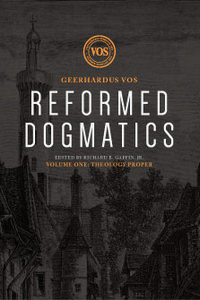
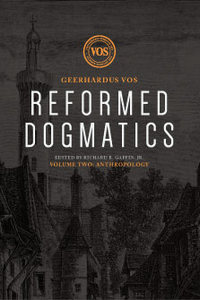
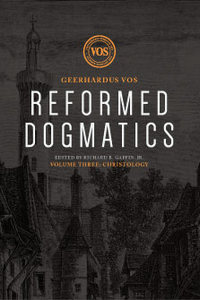
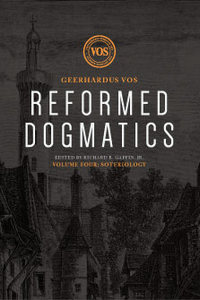
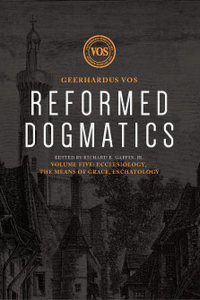

Read Irresponsibly, but please Comment Responsibly